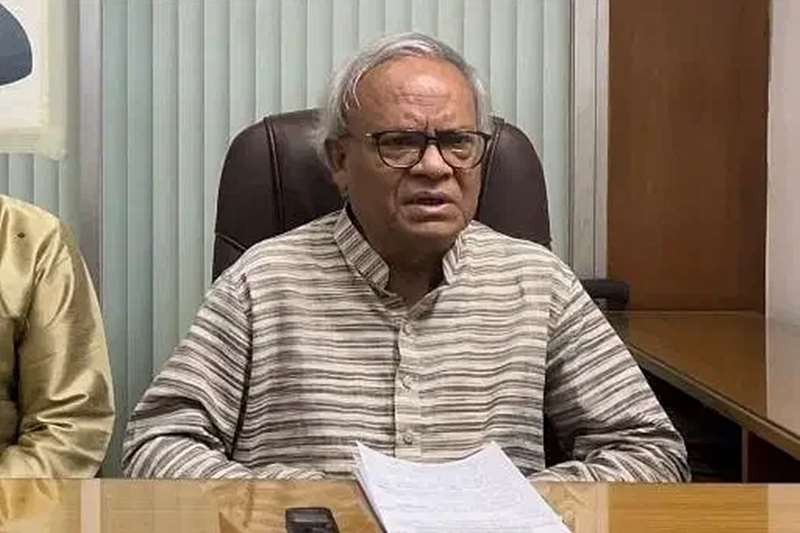Aim to build Smart Bangladesh
This victory is not mine; of the people: Sheikh Hasina

Bangladesh Awami League President and Prime Minister Sheikh Hasina
The Awami League is set to establish the government for an unprecedented fourth consecutive term, achieving a significant majority, as Sheikh Hasina prepares to embark on her fifth tenure as the Prime Minister. The Chief Election Commissioner revealed that the voter turnout in the election was 41.8%.
In the 12th National Assembly elections, the Awami League secured a dominant victory with 223 out of 298 seats, according to the Chief Election Commissioner (CEC) Kazi Habibul Awal. He disclosed these details in a media briefing at the Election Commission office on Monday afternoon.
During the briefing, the CEC stated, "The voter turnout in this election was 41.8 percent, with a total electorate of approximately 119.5 million. Out of these, nearly 50 million people cast their votes, maintaining the same turnout percentage."
Following the Awami League, independent candidates emerged as the second most successful group in the January 7 elections, winning 61 seats. The Jatiya Party, serving as the main opposition in the Jatiya Sangsad, managed to secure only 11 seats, whereas the Awami League had previously won 258 seats in the last national elections.
The National Assembly elections were held on January 7 across 299 constituencies. However, the polling in the Naogaon-2 seat was postponed due to a candidate's demise. The voting commenced at 8 am on Sunday and concluded at 4 pm. Unlike previous elections, this year's polling stations did not witness long queues, and the day was marked by isolated incidents of violence and clashes in certain areas.
A notable number of the independent candidates were identified as leaders and activists from the Awami League and its affiliated organizations.
In the 2024 elections, Sheikh Hasina, the President of the Awami League and the incumbent Prime Minister was re-elected as a Member of Parliament from the Gopalganj-3 seat. The Election Commission announced her victory, with her receiving a total of 249,962 votes under the boat symbol. Her nearest contender, independent candidate M Nizamuddin Lashkar, received 469 votes.
To form a government in the parliament, a political party requires a minimum of 151 out of 300 seats. However, with the Awami League securing over two-thirds of the seats, there remains no doubt about their formation of the government.
The Awami League's election manifesto this year, themed 'Smart Bangladesh: Visible Development, Increased Employment,' highlighted 11 key areas including the stabilization of daily commodity prices, job creation, and the mechanization of agriculture.
Sheikh Hasina's Inaugural Tenure as Prime Minister
On January 12, 1996, Bangladesh held its seventh parliamentary election, marking a significant milestone as the Awami League, led by Sheikh Hasina, formed the government for the first time. However, lacking a majority of 151 seats, the Awami League had to seek the support of the Jatiya Party. This election was historic as it saw Sheikh Hasina take the oath of office as Prime Minister for the first time, 21 years following the tragic assassination of Bangabandhu Sheikh Mujibur Rahman, the nation's founding father, and his family.
Following this tenure, the Awami League faced defeat at the hands of its primary rival, the BNP, in the 8th parliamentary elections of 2001, relegating Sheikh Hasina's party to the main opposition role in Parliament.
The political landscape shifted again with the 9th National Assembly election on December 29, 2008, amidst various incidents. Winning this election, the Awami League formed the government for the second time, with Sheikh Hasina reassuming the Prime Minister's role.
Subsequently, the 10th national election was conducted on January 5, 2014. The Awami League emerged victorious for the third time overall and the second consecutive term, with Sheikh Hasina leading the government. Notably, this election was marked by the absence of several parties, including the BNP.
The 2018 elections, held on December 30, saw the BNP initially hesitant to participate. Eventually, the BNP, along with other political entities, formed the National Unity Front and engaged in dialogues with the Prime Minister, leading to their participation in the elections. Despite allegations of vote rigging and controversy, the Awami League secured a landslide victory, enabling Sheikh Hasina to form her third consecutive and fourth overall government.
The most recent, the 12th National Parliament election held on January 7, saw the BNP, along with 15 other parties registered with the Election Commission, boycotting the election. They demanded a non-partisan, neutral government to oversee the electoral process. In contrast, 28 registered parties, including the ruling Awami League and the main opposition Jatiya Party, participated.
Reflecting on the BNP's stance, Obaidul Quader, the General Secretary of the Awami League and Minister of Roads, Transport and Bridges, commented, "BNP has been defeated in their movement by the voters' turnout." He further criticized the BNP's decision to boycott, attributing their defeat to the peaceful polling environment and the voters' spontaneous support, contrasting it with the BNP's resort to boycott and alleged sabotage tactics.
Following the sweeping victory in the 12th National Assembly elections, Prime Minister and Awami League President Sheikh Hasina, in a discussion with local and international observers and journalists at the Ganabhaban on Monday (January 8), humbly stated, "This victory is not mine; it belongs to the people."
She emphasized the significance of the election, describing it as a pivotal moment for the nation's democratic journey. Looking forward, she outlined her vision for the country, stating, "After achieving Digital Bangladesh, our next goal is to establish Smart Bangladesh." Sheikh Hasina expressed her commitment to eliminating poverty in Bangladesh, asserting, "Not a single person in Bangladesh will remain poor."
Sheikh Hasina also conveyed her determination to create employment opportunities for everyone, underscoring her commitment to improving fundamental rights. "I will ensure job creation for every individual," she affirmed, emphasizing the enhancement and protection of the citizens' fundamental rights as a key aspect of her administration's agenda.










পাঠকের মন্তব্য